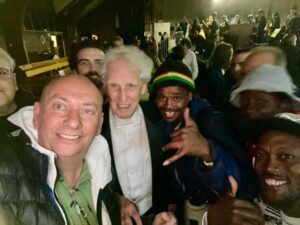Mahler in the dark – a ‘Zanderful’ experience

Few dare to perform Gustav Mahler’s Symphony No. 2, the Resurrection. One would almost have to be insane to try. This magnum opus by the Austro Bohemian composer requires an orchestra of almost 120 classical musicians and a mass choir, making performance economically unfeasible. But in 1996, arguably one of the world’s most famous classical conductors, Benjamin Zander, promised then President Nelson Mandela, that he would bring his Boston Philharmonic Youth Orchestra to perform Mahler at the Regina Mundi Catholic Church in Soweto.
Regina Mundi holds a special place in the anti-apartheid struggle. It was there, in those hallowed halls, that activists would meet and discuss politics while political gatherings around the country were banned. During the 1976 Soweto youth uprising, students fled to the church for sanctuary from the marauding police, whose gunfire had left hundreds of people dead on the dusty streets of South Africa’s biggest township. Police stormed the church looking for student activists, shooting randomly into the sanctuary, scarring the edifice even to this day.
 A day after the anniversary of the 1976 uprising, on 17 June 2023, Benjamin Zander, dressed in a white bow-tie and tails, ascended the alter to perform one of the most dramatic pieces of music ever composed.
A day after the anniversary of the 1976 uprising, on 17 June 2023, Benjamin Zander, dressed in a white bow-tie and tails, ascended the alter to perform one of the most dramatic pieces of music ever composed.
Mahler’s Symphony No. 2 in C minor is the story of death and resurrection. Divided into five movements, it tells the story of death, the memory and longing for a departed, a negotiation between the angels and the deceased, and the ultimate resurrection and afterlife.
The music is deep, moving, and dramatic, reaching a crescendo of exhilarations accompanied by the song of a mass choir intoning in German at the ultimate point of re-birth. At one moment, the orchestra plays every key but one.
As Zander, a previous winner of the Absa Jewish Achiever Special and Extraordinary Award, worked the orchestra into a dramatic climactic frenzy, the lights suddenly went out in Regina Mundi, a victim of South Africa’s constant loadshedding blackouts.
Not missing a beat, Zander continued to conduct the orchestra and choir in almost complete darkness. The audience was in rapture.
Nearly 1 000 people in the audience suddenly took out their cell phones and using the flashlights on their mobile devices, they illuminated the cathedral in the glow of their phones.
When Zander completed the masterpiece, the audience jumped to their feet screaming, ululating, and applauding. Audience members climbed onto their seats and pews giving standing ovation after standing ovation to the genius of the performance.
An elated Zander thanked the audience, saying that he could never have imagined performing Gustav Mahler’s Resurrection in the dark.
The concert will mark one of South Africa’s greatest cultural moments, and will forever imbue the Regina Mundi Catholic Church with another piece of South African history.
As the choir bust into African melody, dancing and weaving their way from the stage, we stood there, motse Shabbat, a bunch of Jews, an Israeli ambassador, a Jewish conductor, having performed a Jewish composer’s symphony in a Catholic Church in the middle of Soweto on a Saturday night.
Click here to view the BPYO South Africa Tour Collection.
 Howard Sackstein - SA Jewish Report
Howard Sackstein - SA Jewish Report